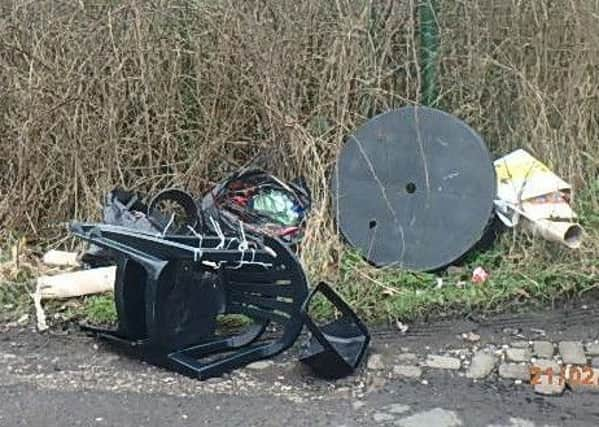New DIY tax is opposed by local councillors


Since my election to serve the Harewood Ward on Leeds City Council in May 2016, fly-tipping has been a regular feature on my casework file. The Harewood Ward – covering a series of villages stretching from Harewood in the west to Collingham in the east, and all the way south to Aberford – is not only the largest council ward in Leeds but also the most rural.
The remote nature of our country lanes, open landscape and discreet farm entrances has made our area prime target for flagrant fly-tippers. They often come late at night, in vans or cars, depositing a range of unwanted items including furniture and, in increasing quantities, spent marijuana plants.
Advertisement
Hide AdAdvertisement
Hide AdIt is precisely because fly-tipping is becoming a real issue in our area that I was angered by new proposals brought forward by the Labour Council to charge households for disposing of inert waste such as garden rubble, plasterboard and old tyres. This charge has since been dubbed the ‘DIY tax’ on people undertaking home improvements.
The problem with this ‘DIY tax’ is two-fold. Firstly, taxpayers in the Harewood Ward already contribute to some of the highest council tax receipts in the city and rightly expect bin collection and waste disposal to be a basic service funded by their council tax. Secondly, and most obviously, it seems to me to be common sense that introducing charges at waste centres such as Thorp Arch will only exacerbate the fly-tipping problem we already have.
If the less environmentally concerned are already dumping their waste in the quiet country lanes of the Harewood Ward because they can’t be bothered driving a few miles further to the tip, then they will most certainly turn to fly-tipping once they have to pay for the privilege of disposing of their waste in a proper manner.
The ruling administration of the Council brought forward this ill-conceived proposal suggesting that the authority could generate £240,000 a year by introducing the ‘DIY tax’. This is a figure few believe will ever materialise. But it is right to consider that the Council does have to balance its budget and if we are to accept that it needs to fill a £240,000 black hole then it’s only right that those opposed to the ‘DIY tax’, such as myself, bring forward alternative budget proposals.
Advertisement
Hide AdAdvertisement
Hide AdThat’s why Conservative councillors in Leeds tabled an amendment to the budget at this week’s debate in Civic Hall, calling for the scrapping of the new ‘DIY tax’ and instead saving £240,000 a year from the council’s strategic budget by reducing the amount of money the authority spends on subsidising full time trade union convenors.
As a trade unionist myself, I recognise that the role of convenors in the workplace is crucially important to ensuring council workers’ rights are upheld. This service should however be paid for through membership fees of union members, not by hardworking taxpayers across the city.
Given the vast wealth of trade unions such as Unite, and the seemingly large amounts of spare cash they have swilling around to donate multi-million pounds to political parties, it is only right that councils such as Leeds should seek to cut this financial freebie before trying to drill even more tax out of hard-pressed households in the city.
Sadly, common sense did not prevail and our amendment was voted down by a majority of Labour councillors. So, the trade unions will continue to benefit from a £240,000 taxpayer-funded subsidy and ratepayers in Leeds will pay for it with new charges on their household waste.